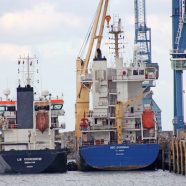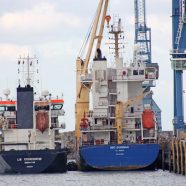BBC Shanghai, a radioactive risk for Asia
October 2015. The BBC Shanghai, owned by Germany-based Briese Schiffahrts GmbH & Co KG, is making the headlines of the world’s maritime shipping news. She has been selected by the French nuclear operator AREVA to ship to Australia radioactive waste reprocessed in Normandy at the La Hague plant. However, the ship had a bad record regarding technical deficiencies as attested by the maritime authorities of all continents; she had been detained three times in Bilbao (Spain), Gladstone (Australia) and in March 2015 in Honolulu (Hawaii, United States). The international mobilization to demand the chartering of a safe ship will do nothing about it, the BBC Shanghai loads 25 tons of radioactive waste and leaves Cherbourg (France) on October 15 for Port Kembla near Sydney. Indonesia has denied her access to its waters. She arrived at Port Kembla on December 5 after a 25,000 km trip.
BBC Shanghai, a radioactive risk for Asia
October 2015. The BBC Shanghai, owned by Germany-based Briese Schiffahrts GmbH & Co KG, is making the headlines of the world’s maritime shipping news. She has been selected by the French nuclear operator AREVA to ship to Australia radioactive waste reprocessed in Normandy at the La Hague plant. However, the ship had a bad record regarding technical deficiencies as attested by the maritime authorities of all continents; she had been detained three times in Bilbao (Spain), Gladstone (Australia) and in March 2015 in Honolulu (Hawaii, United States). The international mobilization to demand the chartering of a safe ship will do nothing about it, the BBC Shanghai loads 25 tons of radioactive waste and leaves Cherbourg (France) on October 15 for Port Kembla near Sydney. Indonesia has denied her access to its waters. She arrived at Port Kembla on December 5 after a 25,000 km trip.
Wanted : BBC Shanghai
After unloading on December 5 in Australia what she had loaded on October 14 in France, the BBC Shanghai, an occasional nuclear waste carrier, is now heading for Shanghai. Her owner is German. She is flying the Antigua & Barbuda flag. Her profile is alarming. As soon as she is calling in a port, the BBC Shanghai is targeted by maritime authorities and submitted to a detailed inspection.
Please refer to Robin des Bois press releases :
Radioactive waste – Robin des Bois (Robin Hood) is calling for an intervention by the Australian and French governments, October 10, 2015. 7:45 pm
Radioactive waste – BBC Shanghai at Cherbourg, October 14, 2015
And the map « Das Bato », October 15, 2:00 pm on the performances of the BBC Shanghai
Australian waste: Divergence between Robin des Bois and the French Ministry of Environment
Robin des Bois regrets that the French Ministry of Environment decided to refuse the importation of 132 tonnes of chemical waste from Sydney, Australia.
The NGO worked over numerous months with Orica, holder of the waste, and with Trédi, disposal contractor of hazardous waste, to develop a method of operation likely to unblock an inextricable situation in Australia and to reduce, to a minimum, maritime transport risks.
Unfortunately, the Ministry of Environment joined the gang and shares certain caricatures of French and international environmentalist, by not taking into account the benefits of the plan well thought out by Robin des Bois, Trédi and Orica. (cf. Robin des Bois’ viewpoint on the importation of HCB from Australia to France. June 16, 2014)
Robin des Bois’ viewpoint on the importation of HCB from Australia to France
Robin des Bois was consulted by Orica over the possible treatment, at Trédi’s incinerator at Salaise-sur-Sanne (France), of HCB waste stockpiled, since 1991, in Botany situated 8km from Sydney. Two representatives from Robin des Bois gathered information on site at the end of 2013 in order to understand why an industrial firm, located in Australia, an economically developed country, would want to export waste 17,000km away.
It was noted that the 13,800 tonnes of waste is stockpiled in a highly urbanised area. The Botany stockpile is exposed to natural and industrial external threats. The HCB concentration of the stockpile ranges from 0.003% to 89%. Certain waste requires repackaging every 4-5 years. Repackaging operations increase the total weight of the waste by 2.0% on average, per annum. Orica’s stockpile is historical and HCB is no longer produced in Australia.










